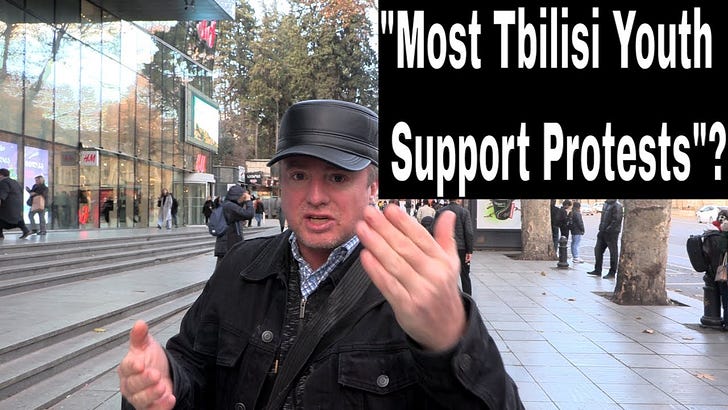In my latest report from Tbilisi, Georgia, I focused on capturing the perspectives of the city's youth, as tensions between protesters and the government remain high. The interviews I conducted during this report shed light on the growing dissatisfaction of Georgia's younger generation with their government and their vision for the future.
I began my coverage near Liberty Square Metro Station, just a short distance from the Parliament building where the ongoing protests have centered for weeks. This location offered a prime opportunity to engage with young voices who are either actively participating in the protests or closely following the political situation.
One of the key takeaways from my conversations was the frustration many young people expressed with the current government. They believe that the administration is out of touch with their generation's priorities, especially regarding education, opportunities, and alignment with Western values. Several young interviewees pointed out that they feel ignored and dismissed by those in power, creating a widening gap between the youth and the government.
One of the young individuals I spoke with explained how disillusionment with the government has motivated many of their peers to take to the streets. They argued that the protests reflect the collective voice of a generation seeking change. In their words, the government seems unwilling to listen or adapt, leaving the youth with no other choice but to push back publicly and loudly.
Another interviewee highlighted the importance of these protests in shaping the future of Georgia. They expressed hope that their actions would lead to more opportunities and a stronger alignment with European democratic values. This sentiment reflects a growing desire among young Georgians for closer ties with the European Union and a rejection of what they perceive as outdated governance.
However, as I moved further away from the immediate protest sites, the diversity of opinions became apparent. Not all young people in Tbilisi fully support the demonstrations. Some voiced skepticism about the motivations behind the protests, questioning whether they were truly grassroots movements or influenced by external forces. These dissenting opinions underscore the complexity of the political climate in Georgia and the challenges of uniting public sentiment.
One of the most striking aspects of my interviews was the passion and determination of the youth involved in the protests. They see themselves as the future leaders of Georgia, fighting for a country that aligns with their values and aspirations. For them, the protests are not just about short-term changes but about establishing a long-term vision for Georgia's place in the world.
These interviews provided a window into the minds of a generation that feels they are at a crossroads. The youth of Tbilisi, whether actively protesting or simply voicing their frustrations, are grappling with the challenges of navigating a political system they see as resistant to change.
As the protests continue to evolve, the voices of Georgia's young people will remain a critical part of the story. Their concerns, hopes, and demands for change reflect not just the immediate political tensions but also the broader struggle for Georgia's identity and future.




Youth in the streets should not decide governments. They are so easily manipulated. Obama promised "change" and "hope" and gave us more endless wars. "European values" are a charade. We need to seek virtue. "Values" are just slogans.
Sorry, but idealism of youth aside, these kids are morons.
Georgia isn’t a European country nor EU member and never will be, and the OSCE found no major problems with the recent Georgian elections.
So in other words, these kids want “democratic, European values” while acting in a manner wholly incompatible with those values.
If they want to live in a “Democratic” country they need to learn to respect elections and those with opposing viewpoints.